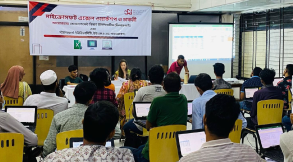Women in low-income countries are often excluded from the labour market, reducing their financial autonomy, and negatively impacting their physical and mental well-being and that of their children (Verick, 2014; Field et al., 2018). The author proposes that policies designed to increase women’s income generation may only be successful if they also address societal barriers preventing women from entering the labour force. This project aims to provide the first experimental evidence for one such barrier: paternalistic discrimination, the preferential treatment of men to protect women from jobs or tasks perceived as harmful or difficult. Specifically, the proposed study uses a field experiment to test: i) whether employers discriminate paternalistically, ii) how paternalistic discrimination affects skill accumulation and promotion rates, and iii) to what degree paternalistic discrimination affects welfare in different industries.
The author enlists 600 employers in Bangladesh to make hiring decisions for a real one-day Excel job during the night shift and experimentally vary the perceived job costs by informing employers that hired workers are provided free safe transport home. They then test whether women are hired less often if the perceived job costs are high (no transport). All applicants, regardless of whether they were hired, take an Excel promotion test the following day, which determines whether they receive a bonus (“promotion”). As this test directly tests the skills that Excel data processing assistants used during the workday, we are able to test whether paternalistic discrimination contributes to the gender skill gap (i.e., women’s skill accumulation is larger with safe transport) and the gender promotion gap (i.e., women are promoted more often with safe transport).
This project will have important implications for understanding the direct effects (women’s labour supply) and indirect effects (employers’ labour demand) of information or transport interventions. Thus, the results of this study will provide high-quality rigorous evidence that feeds directly into key policy debates in low- and middle-income countries. If paternalism is a driving force behind discrimination, traditional interventions that aim to improve candidates’ qualifications (for example, through educational incentives) are unlikely to be effective, while interventions aimed at correcting employers’ beliefs about what is — and is not — in women’s best interest may be more successful.






















































